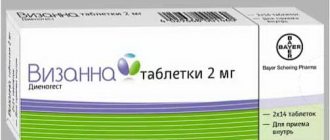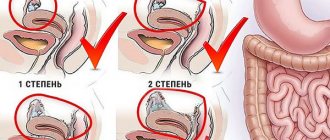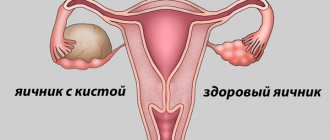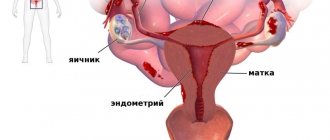How does Janine work for endometriosis?
Zhanin's therapeutic mechanism is associated with the blockade of gonadotropic releasing factor (GnRH).
The principle of action of Zhanine for endometriosis: The drug daily introduces the same, strictly defined amount of sex steroids into the body. Consequently, hormonal “bursts” disappear and ovulation does not occur. No ovulation - no menstruation. Symptoms of the disease subside and remission occurs. The patient feels healthy.
By “leveling out” the hormonal levels, Janine plunges the woman’s reproductive system into a state of “medicinal rest.” The artificial period of “ovarian rest” is similar to the natural period of pregnancy or lactation. At this time, structural restructuring, degradation and atrophy of endometriosis foci occurs.
Along with antiproliferative properties, Janine has anti-inflammatory (inhibits the synthesis of prostaglandins - mediators of the pro-inflammatory cascade) and antiandrogenic effects.
The combination of strong progesterone and scanty estrogenic effects ensures good tolerability of the drug.
Return to contents
The effectiveness of the drug Zhanine for endometriosis - reviews
Any hormonal therapy for endometriosis does not guarantee final recovery. The productivity of the mild therapeutic effects of COCs is quite low.
The effectiveness of treatment of minor forms of endometriosis by Janine is 58%
In what cases is treatment of endometriosis with this drug advisable? Indications for use of Zhanine for endometriosis:
- Suspicion of uterine endometriosis, i.e. There are symptoms of the disease, but there is no indisputable objective laboratory and instrumental confirmation of the disease.
- Minor forms of endometriosis.
- Mild endometriosis.
- Endometriosis of the uterus (adenomyosis) stages 1-2.
- Treatment of endometriosis-related pelvic pain.
- Dysmenorrhea.
- Prevention of secondary anemia associated with hyperpolymenorrhea.
- Prevention of disease relapse after surgical treatment of external genital endometriosis.
- As a maintenance treatment after completion of the GnRH A course.
- Restoring fertility.
Treatment of endometriosis by Janine
To achieve the maximum therapeutic effect, the drug Zhanine for endometriosis is prescribed in a continuous, prolonged mode.
“Extended regimen” means that the medicine is taken over a long course, for 3-6-9 months to 1.5 years.
The hormonal drug Zhanine is used only as directed and under the supervision of a medical specialist with strict adherence to the individual dosage regimen
How much to drink Janine for endometriosis:
(doctor's consultation required)
Scheme: 42+7 In this case, Janine is taken for 42 days in a row, one tablet once a day. Then a week break is taken (no need to take pills for 7 days)
. After which the drug is taken again for 42 days in a row until the next 7-day break, etc.
If you take the pills every day, you will not get your period. Menstruation (withdrawal bleeding) occurs during a 7-day break from taking the medicine (in this case - once every 2 months).
Menstruation during the course of treatment with Janine is, as a rule, quite scanty. This indicates the effectiveness of therapy.
Recommended regimen: 63+7 In this regimen, Janine should be taken continuously for 63 days. Then a 7 day break. Again 63-day intake. Again a 7-day break, etc.
Extended courses for Janine
How long to take Janine for endometriosis? The duration of the course of treatment is six months, nine months, a year... - prescribed by the attending physician.
Return to contents
Contraindications
Despite the fact that the effectiveness of drugs for the treatment of endometriosis is recognized by evidence-based medicine, not all women suffering from this disease can take Janine. It is not recommended to take the medicine if:
In the preoperative period and after serious extensive injuries requiring immobilization (immobilization) for a long period, Janine is not recommended for use. If a woman smokes, this drug is not recommended for use after the age of 35.
In each specific case, it is necessary to evaluate how much the benefit of using Janine exceeds the potential harm that can be caused by its use.
Janine - instructions for use for endometriosis
How to take Janine for endometriosis?
- 1 tablet 1 time per day at the same time, preferably in the evening after meals.
- Recommended dosage regimen for endometriosis: 63+7 (see above)
The first blister contains 21 tablets.
The release form of Janine is different:
- There are packages with 1 blister in 1 box.
- There are packages with 3 blisters in 1 box.
Two forms of release Janine
What to do if for some reason you did not take the pill on time? If the evening dose of the drug is missed, then the “forgotten” tablet should be taken in the morning of the next day. The next tablet is taken in the evening of the same day at the usual time.
What to do if, against the background of continuous use of Janine, “menstruation” suddenly begins? It happens that during the period of continuous use of pills, scanty spotting bloody discharge from the uterus or “breakthrough bleeding” similar to menstruation appears. At the same time, light menstruation occurs as expected - during the break between doses of the drug.
There is no need to be afraid of these phenomena.
They do not pose any threat to health (let alone life) and do not mean that the treatment is ineffective. It is enough to address this problem to “your” gynecologist. If necessary, the doctor will adjust the individual dosage regimen.
In most cases, scanty intermenstrual bleeding does not require discontinuation of the drug and goes away on its own, after the body and uterine mucosa get used to the treatment.
Precautionary measures
Despite the high safety profile and good tolerability, the use of Janine (like any hormonal drug) has a number of limitations.
Absolute contraindications to taking Janine:
- Oncological diseases: any malignant or benign tumors, including carcinoma of the uterus and appendages.
- Pregnancy and breastfeeding.
- Thrombophlebitis, thrombosis, thromboembolism of veins, arteries of any location.
- Uncompensated or complicated by vascular pathology diabetes mellitus.
- Severe form of migraine.
- Uncompensated cardiovascular pathology.
- Uncompensated liver diseases.
- Intolerance (allergy) to any component of the drug.
- Psychopathology.
In other cases, Janine is prescribed by a gynecologist with the permission of the therapist after consultation with doctors of other specialties.
Patients with the following diseases (conditions) should take Zhanine with caution:
- Epilepsy.
- Obesity.
- Smoking.
- Diabetes.
- Pathology of the gastrointestinal tract.
- SLE, Crohn's disease.
- Phlebitis, arteritis.
- Hypertension.
- Tendency to angioedema.
- Atherosclerosis, lipid metabolism disorder.
- Sickle cell anemia.
- Multiple sclerosis.
If muscle spasms, swelling, severe pain in the limbs, severe headaches, intense chest pain, deterioration in visual acuity, or vomiting appear during treatment with Zhanine, you should stop taking the drug and immediately consult a doctor.
Is it possible to drink alcohol during treatment with Janine?
There are no direct contraindications to drinking alcohol. But ethyl alcohol is toxic. It worsens the tolerability of the drug, creates additional stress on the liver, and can provoke negative (sometimes fatal) conditions. In addition, drinking alcohol is one of the factors that increases the risk of developing endometriosis. Therefore, any woman should give up alcohol in principle.
The harm of alcohol in endometriosis Return to contents
Possible side effects
When the drug is used correctly, side effects are quite rare. These include:
- frequent headaches, migraines;
- pain in the chest and swelling;
- spotting at the wrong time of the menstrual cycle;
- decreased sex drive;
- abdominal pain, nausea or vomiting;
- mood swings;
- general swelling, weight gain;
- skin rashes, itching;
- constant fatigue;
- bowel disorders;
- thromboembolism (very rare).
If a woman smokes, it is necessary to get rid of this habit before starting therapy.
Advantages and disadvantages of Janine for endometriosis
Pros:
- Today, Janine is the only COC with the progesterone component Dienogest. It is Dienogest that is recommended by WHO experts as the first choice progestogen for the treatment of endometriosis.
- The bioavailability of Dienogest when administered orally is 90%, which is several times higher than that of progesterone components and other COCs.
- Antiandrogenic effect of Dienogest: - provides Zhanine with additional bonuses that are beneficial for the female body: treats acne, blackheads, oily seborrhea, improves the general condition of the skin and hair, etc. - negates the undesirable effects associated with androgenic influence: does not affect body weight, does not increase blood pressure, does not worsen the lipid profile, etc.
- According to reviews from German specialists, it is the drug Valletta, registered in Russia as Zhanine, that is ideal for oral contraception for women with endometriosis.
To prescribe Zhanin for endometriosis, laparoscopic or histological confirmation of the diagnosis is not required.
Minuses:
- The therapeutic effect of Janine in the case of endometriosis is much lower than that of GnRH A.
- Janine cannot be an alternative to surgical treatment of the disease.
By and large, for endometriosis, Janine is used as a supportive, anti-relapse and preventive agent in the complex treatment of the disease.
Return to contents
What are the benefits of contraceptives?
Contraception during menopause has a positive effect on regulating hormonal balance. All active components of these drugs have a certain concentration, taking into account which the doctor prescribes the use of a certain contraceptive during menopause.
With the onset of menopause, certain changes occur in a woman’s body, manifested by symptoms such as:
- attacks of flushing;
- the mucous surfaces of the intimate areas become thinner, and dryness appears, causing unpleasant discomfort in the vaginal area;
- psycho-emotional balance is disturbed with the appearance of attacks of aggression, nervousness and tearfulness;
- the performance of the cardiovascular system is impaired;
- Blood pressure becomes spasmodic;
- metabolic disorder, accompanied by an active gain of extra pounds;
- leaching of calcium from bone tissue, which leads to osteoporosis and osteochondrosis.
These factors can manifest themselves in every woman to varying degrees. And if we take into account the fact that menstrual flow may appear for another couple of years, then the menopause can become an aid to the development of disorders in various body systems.
Contraceptives help alleviate the symptoms of menopause and prevent possible exacerbations of existing pathologies. These drugs act on the ovaries with suppressive force, providing the body with preparation for the normal cessation of the functioning of the gonads. In addition, the medicinal substances contain estrogens, due to the deficiency of which the course of the menopause is so painful.
During menopause, a woman's body requires a certain level of missing hormones to ensure normal functioning. It is taking this factor into account that doctors draw conclusions about the need to use certain contraceptive drugs containing the required amount of estrogens.
Attention! Those contraceptives that can be used during reproductive age to prevent unplanned pregnancy are not suitable for protecting the body of a mature woman entering menopause, since the hormone content in these drugs is too high.
With the onset of the premenopausal period, experts recommend taking tablets with low doses of hormonal substances, which include:
- Lindinet 30 , containing 30 µg ethinyl estradiol and 75 µg gestodene, which is a monophasic drug;
- Janine , which contains 30 µg ethinyl estradiol and 2 mg dienogest, is also a monophasic drug that has an additional cosmetic effect;
- Jess , which includes 20 mcg ethinyl estradiol and 3 mg drospirenone;
- Rigevidon , which contains 30 mcg ethinyl estradiol and 150 mcg levonogestrel;
- Siluet , containing 30 mcg ethinyl estradiol and 2 mg dienogest; this drug is a complete analogue of the drug Janine;
- Marvelon , consisting of 30 mcg ethinyl estradiol and 150 mcg desogestrel.
In addition, contraceptives consisting mainly of gestagens, for example, such as Norplant or Depo-Prover, can be prescribed. In addition to mitigating menopausal symptoms, they prevent the exacerbation and development of existing tumors localized in the mammary glands or genitals. They also contribute to the regular discharge of menstrual-like discharge.
You need to start taking oral contraceptives under the supervision of specialists, especially during menopause, when the body's responses to taking drugs are unpredictable. Let's take a closer look at some contraceptive drugs and their effects on the female body.
Janine
This drug is very often prescribed during the premenopausal period to prevent unplanned pregnancy, as well as to alleviate menopausal symptoms, through the intake of the necessary hormonal substances included in this drug into the body. The use of the drug Janine will help normalize hormonal levels and the menstrual cycle.
Thanks to the cosmetic effect that the drug Janine can provide, during the onset of menopause, you can get rid of skin problems that appear during the period of hormonal imbalance at the time of restructuring of the body, that is, Janine will help eliminate acne on the skin and bring it to a normal state.
Janine and pregnancy after taking
The drug Zhanine does not affect fertility
Zhanine, as mentioned above, is a contraceptive. Accordingly, you cannot become pregnant while taking it.
At the same time, Janine does not have any negative influences
on a woman’s fertility, and in some cases even restores it. You can try to get pregnant immediately after finishing the course of treatment with the drug.
Sometimes it may take several months for the menstrual cycle to fully return. After which the desired pregnancy occurs without difficulty.
If this does not happen, you should consult a doctor to find out and eliminate the causes of unrelated
with a retrospective reception from Janine.
Positive effects of the drug on the body
The positive effects of Zhanin in the treatment of endometriosis include the following:
- Reducing pain. The drug blocks enzymes that are involved in the production of prostaglandins, which are the main cause of inflammation and pain.
- Improvement of general physical and psychological condition. Since the drug eliminates symptoms that cause discomfort to a woman, this has a positive effect on her overall well-being.
- Normalization of the menstrual cycle when taking the drug.
- Reducing the amount of discharge. As a result of the fact that there is no ovulation while taking Zhanine, endometrial tissue is not formed in large quantities, therefore bleeding stops and the volume of discharge during menstruation decreases.
In addition, many women note that after taking the drug, the condition of their hair and skin improves. Positive changes are especially noticeable in patients suffering from acne.











